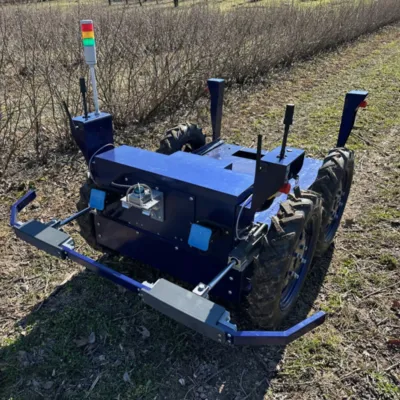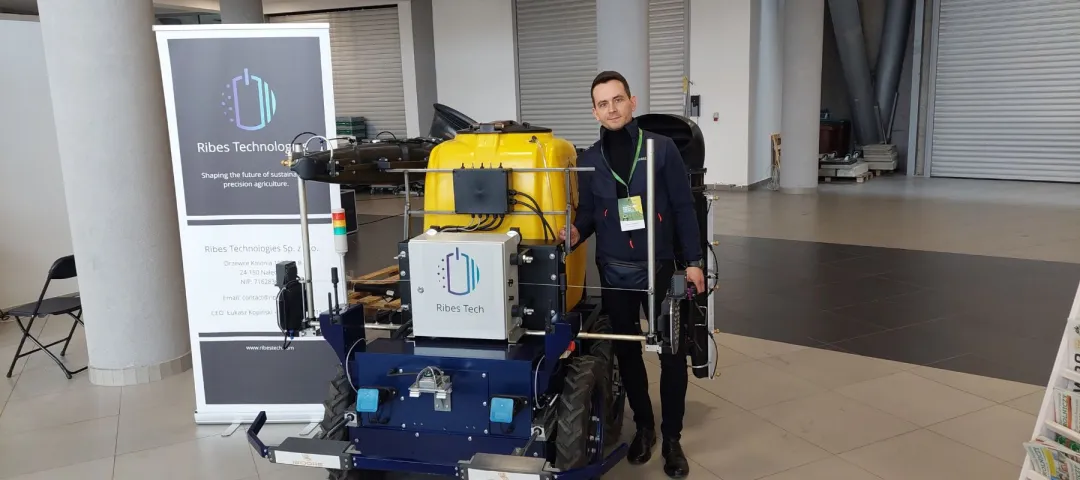General information
RDP Priority
- P1. Knowledge transfer and innovation
RDP Focus Area
- 1A: Innovation & cooperation
RDP Measure
- M16: Cooperation
Beneficiary type
- Operational group
Summary
The OWOCE 4.0 (‘Fruits 4.0’) Operational Group (OG) wanted to develop a new technology to improve the quality of industrial-scale blackcurrant fruit production while reducing the use of plant protection products. As part of their EIP-AGRI project, the OG used CAP funds to purchase the necessary equipment, including specialised software, for conducting research on an orchard farm and for building an autonomous platform.
Results
- The equipment and software allow fruit growers to use protection agents more effectively.
- The project results show that the new tool helped improve the quality of the fruit and reduce costs.

Funding
Total budget: 3 868 893 (PLN)
EAFRD: 2 054 570 (PLN)
National/Regional: 1 307 323 (EUR)
Private/own: 507 000 (EUR)
Ressourcen
Context
Currant cultivation can be either conventional or organic, and both have their advantages and disadvantages. In large-scale industrial production, the challenge is to limit the amount of plant protection products used and their residues in the fruit, while maintaining maximum quality.
The OWOCE 4.0 (‘Fruits 4.0’) Operational Group was implemented by a consortium of entities from the business, science, agricultural consulting, and fruit farming sectors. It was led by agricultural technology developer Ribes Technologies Sp. z o.o., with testing and development taking place on the orchard farm of Przemysław Wijaszek. The farm is located in the Lublin province in the town of Klementowice, Kurów municipality, and consists of over 100 ha of orchard crops, including currants, apples and plums. While most of the farm is dedicated to organic production, the increasing scale of its conventionally farmed crops made it necessary for the farmer to investigate modern solutions for pest detection and targeted spraying.
Objectives
The main aim of this project was to develop technology that would improve the quality of the (industrial) blackcurrant fruit crop while reducing the use of plant protection products.
Activities
Project activities included:
- purchasing equipment for processing and storing digital data, as well as structural elements such as cameras and light sources, and equipment for the workshop;
- purchasing and developing an artificial intelligence (AI) algorithm model;
- installing digital pheromone traps in the currant plantation;
- installing a vision module that uses cameras and light sources to collect data about the location of pests on the currant plantation;
- purchasing drones with multispectral and thermal cameras for field mapping;
- preparing vegetation indicator maps from drone photos;
- obtaining data and processing it using AI software;
- installing an autonomous mobile platform (robot vehicle) on the currant plantation;
- conducting training for drone and robot operators.
During the project, visits and meetings were held on farms, and conferences were organised to share and discuss the project results. The representatives of the consortium also presented the project at domestic and foreign events.
Main results
- Thanks to the new tool, the fruit grower has constant insight into the occurrence of pests and can make informed decisions about the use of sprays. The tool enables the recording of all activities, as required in the electronic treatment book.
- The hardware, software and technological solution system improves the quality of blackcurrants grown on the industrial plantation by significantly reducing the use of plant protection products.
- Thanks to the use of intelligent, AI-powered devices for real-time recognition and monitoring of the blackcurrant bush crops, it was possible to use an autonomous mobile platform (built during the project) to perform selective spraying.
- Although the entire research process focused on the two pests that cause the greatest losses in blackcurrant cultivation, it seems that with some small adjustments, the solutions can be transferred to other fruit crops and other pests.
Key lessons
- The M16 - Cooperation measure is very important for agriculture, as it provides support for innovative projects that combine scientific work with agricultural practice. There should be more actions that support such partnerships, as well as follow-on funding and the removal of legal restrictions to further develop products and services for the sector.
- Building a consortium and planning joint activities can be very challenging. This is due to the complicated process of preparing the application, the lengthy process of its assessment, and the signing of the funding agreement. The delays pose a threat to the smooth implementation of projects.
Łukasz Kopiński

